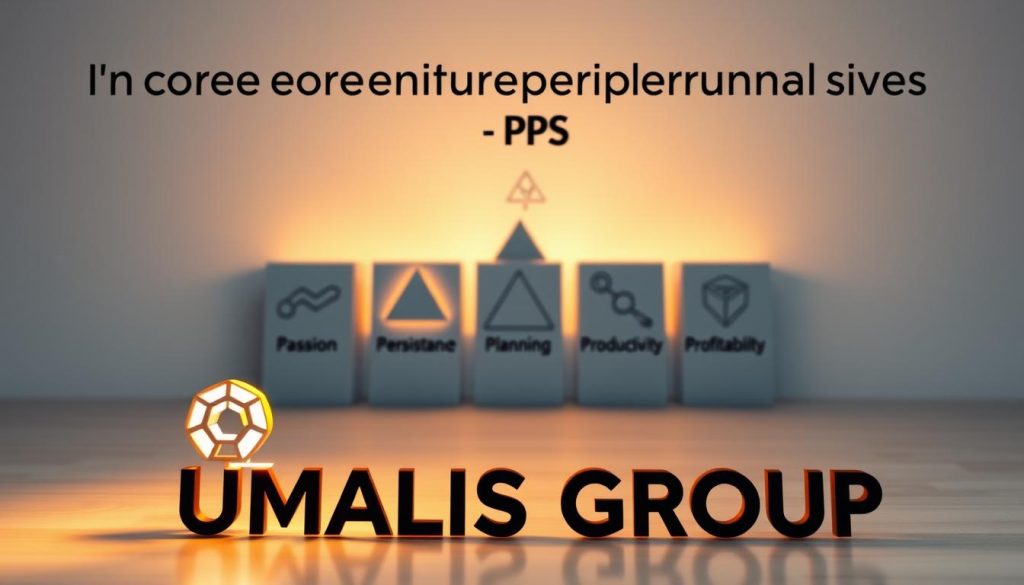In 2021, over 5.4 million Americans filed new business applications—a record high. This surge reflects a growing shift toward independent careers, from freelancers to consultants. But what separates those who thrive from those who struggle? Often, it’s the entrepreneurial spirit—a mix of resilience, creativity, and strategic thinking.
Take Steve Jobs, for example. He dropped out of college but built Apple by embracing risk and innovation. His story proves formal education isn’t the only path to success. Today, this mindset isn’t just for CEOs. Freelancers, gig workers, and small business owners all benefit from these skills.
This article explores actionable strategies to cultivate that mindset. Whether you’re launching a side hustle or scaling a venture, developing leadership and adaptability can turn challenges into opportunities. Let’s dive in.
Table of Contents
Key Takeaways
- Independent careers are booming, with 5.4 million new U.S. businesses in 2021.
- Entrepreneurial spirit drives success beyond traditional business ownership.
- Resilience and creativity matter more than formal education.
- Freelancers and gig workers can apply these principles too.
- Practical strategies help build business acumen and confidence.
What Is Entrepreneurial Spirit?
Rachelle Sassine didn’t wait for a promotion. Instead, she launched her construction business, proving that the entrepreneurial spirit thrives outside corporate ladders. It’s a proactive mindset—one that asks, « How could we do this better? » daily.
Unlike traditional employees, entrepreneurs embrace uncertainty. They see challenges as stepping stones. This attitude isn’t limited to startups. Corporate innovators and self-employed professionals use it to drive growth.
« It’s about turning obstacles into opportunities—whether you’re freelancing or leading a team. »
BetterUp’s coaching programs highlight how this mindset transforms careers. Their 12-point assessment measures traits like:
- Risk positivity
- Collaboration
- Decisiveness
You don’t need a fancy title to think like an entrepreneur. You just need the courage to act.
Traits of an Entrepreneurial Spirit
Success in self-employment hinges on mastering three critical traits. These behaviors turn challenges into stepping stones and fuel long-term growth. Let’s break them down.
Risk-Taking and Resilience
First Source reports 90% of startups fail, but the top 10% mitigate risks strategically. Take Rachelle Sassine, who sacrificed five months’ salary to launch her construction firm. Her calculated gamble paid off.
« Risk management isn’t about avoidance—it’s about informed decisions. »
Build resilience by:
- Setting aside emergency funds (6+ months of expenses).
- Testing ideas through small-scale pilots.
- Reframing failures as data points.
Lifelong Learning and Adaptability
The best freelancers treat learning like oxygen. Third Source recommends dedicating 30 minutes daily to industry podcasts or newsletters. Reverse-mentoring programs—where juniors teach seniors tech skills—are also powerful.
Try these resources:
- Masters of Scale (podcast).
- Weekly LinkedIn industry digests.
- Local meetups for growth mindset networking.
Proactive Problem-Solving
Second Source’s « actionable thinking » framework shifts focus from problems to solutions. Compare these approaches:
| Problem-Focused | Solution-Focused |
|---|---|
| « Client budgets are too small. » | « How can I add value within their budget? » |
| « The market is saturated. » | « What niche needs aren’t being met? » |
This mindset turns obstacles into opportunities—one actionable step at a time.
Cultivating Entrepreneurial Spirit in Your Career
Turning your job into a mini-business unlocks hidden growth potential. Whether you’re freelancing or climbing the corporate ladder, adopting a founder’s mindset creates opportunities. Here’s how to apply it daily.
Treating Your Role Like a Business
Track key metrics just like business owners do. First Source recommends monitoring:
- Client acquisition costs (time + resources per project).
- Revenue per hour to identify high-value tasks.
- Net promoter scores to gauge client satisfaction.
Advocate for internal « side projects » too. A marketing associate might propose a podcast to boost brand visibility. These strategies foster innovation and visibility.
Seeking Leadership Opportunities
Only 10% of professionals are natural leaders, per First Source. But skills can be learned. Start small:
- Lead an Employee Resource Group (ERG) to build influence.
- Join cross-departmental committees to expand networks.
« Leadership coaching increases promotion readiness by 4x. »
Compare passive and proactive approaches:
| Reactive Role | Proactive Leadership |
|---|---|
| Waits for assignments | Identifies gaps and proposes solutions |
| Works in isolation | Collaborates across teams |
Every role holds opportunities to lead—you just need to claim them.
The 5 P’s of Entrepreneurship
Behind every thriving business lies a foundation built on five critical principles. These pillars—plan, passion, patience, perseverance, and problem-solving—turn ideas into sustainable ventures. Let’s break them down.

Plan: Your Roadmap to Success
Rachelle Sassine’s construction business succeeded because she mapped every step. Her plan included:
- Material cost projections (with 15% buffer for delays).
- Flexible deadlines to accommodate supply chain issues.
« A goal without a plan is just a wish—budget for surprises. »
Passion: Fuel for the Long Haul
Steve Jobs famously said, « The only way to do great work is to love what you do. » This passion sustains entrepreneurs through tough phases. Christian Person’s journey from unemployment to founding Umalis Group proves how purpose drives persistence.
Patience: Timing Matters
First Source notes most businesses take 3 years to stabilize. Build resilience by:
- Setting quarterly milestones, not just annual goals.
- Celebrating small wins to maintain momentum.
Perseverance: Grit Over Glamour
With 90% of startups failing, grit separates survivors from statistics. When challenges arise:
- Reframe setbacks as learning opportunities.
- Keep emergency funds (6+ months of expenses).
Problem-Solving: Think Like a Designer
Design thinking workshops teach entrepreneurs to:
| Traditional Approach | Solution-Focused Mindset |
|---|---|
| « Our prices are too high. » | « How can we demonstrate greater value? » |
Master these 5 P’s, and you’ll build more than a business—you’ll create a legacy.
Replenishing Your Entrepreneurial Drive
Keeping your motivation strong is key for long-term success. Whether you’re freelancing or running a business, challenges will come. The best way to stay ahead? Focus on goals, embrace change, and seek mentorship.
Setting Intentional Goals
Clear targets keep you moving forward. Use the SMART framework to create actionable plans:
- Specific: « Increase client base by 20% » beats « Get more work »
- Measurable: Track progress with weekly reviews
- Achievable: Set stretch goals that push but don’t break you
Second Source found professionals who review goals quarterly grow 3x faster than peers. Schedule these check-ins like client meetings—non-negotiable.
Adapting to Change Without Fear
Market shifts happen. The pandemic proved businesses that pivot survive. Try these strategies:
| Challenge | Adaptation Strategy |
|---|---|
| Lost major client | Diversify income with 3 new service offerings |
| Industry changes | Take one new certification every 6 months |
« Fear shrinks opportunities—curiosity expands them. Ask ‘What if this works?’ daily. »
The Power of Mentorship
Guidance accelerates growth. BetterUp’s coaching program participants report:
- 42% faster skill development
- 35% higher confidence in decisions
Find mentors through:
- LinkedIn outreach with personalized connection notes
- Local business meetups (virtual or in-person)
- Industry conferences with Q&A sessions
Remember—even mentors need mentors. Make learning a lifelong habit.
Real-World Examples of Entrepreneurial Spirit
Breaking barriers defines true entrepreneurial success—ask Rachelle Sassine. As one of few women in construction, she turned skepticism into strategy. Her firm now dominates New York’s luxury renovations. Small business owners like her prove industries evolve when outliers lead.

Corporate roles foster innovation too. A BetterUp-coached IT director redesigned workflows, cutting project delays by 40%. Her secret? Borrowing startup tactics:
- Weekly « fail fast » retrospectives.
- Cross-team hackathons for solutions.
« Intrapreneurs drive change where others see bureaucracy. »
Airbnb’s pandemic pivot exemplifies crisis agility. When travel halted, they:
| Challenge | Innovation |
|---|---|
| 88% revenue drop | Launched « Online Experiences » (cooking classes, virtual tours) |
Compare startup vs. corporate success metrics:
- Startups: Speed to market (Airbnb’s 3-week feature rollouts).
- Intrapreneurs: Internal adoption rates (e.g., 70% team usage of new tools).
Whether freelancing or leading teams, specialized skills paired with adaptability rewrite rules. The best business leaders don’t wait for change—they build it.
Conclusion
The surge in independent careers proves adaptability is the new career currency. With 2021’s 5.4M new U.S. businesses, thriving requires more than skills—it demands entrepreneurial thinking.
Define success on your terms. Start small: dedicate 30 minutes daily to learning, calculate risks like a pro, and seek mentors. These steps future-proof your career in uncertain markets.
Ready to test your readiness? Take BetterUp’s free assessment to pinpoint your growth areas. Whether freelancing or leading teams, a sense of purpose paired with action turns goals into results.
FAQ
What does entrepreneurial spirit mean for independent professionals?
It means embracing a proactive mindset—focusing on innovation, problem-solving, and resilience while navigating challenges in your career. Independent professionals with this approach see obstacles as opportunities for growth.
How can I develop an entrepreneurial mindset in my work?
Start by treating your role like a business. Set clear goals, analyze industry trends, and seek leadership opportunities. Continuous learning and adaptability are key to staying ahead.
Why is risk-taking important for career growth?
Calculated risks lead to new opportunities and skill development. Whether pivoting your services or investing in training, stepping outside your comfort zone drives long-term success.
What are the 5 P’s of entrepreneurship?
They are Purpose, Plan, Persistence, People, and Profit. Together, they create a framework for sustainable growth—balancing vision, strategy, relationships, and financial health.
How do successful professionals stay motivated?
They set intentional goals, adapt to industry shifts, and leverage mentorship. Surrounding yourself with supportive networks helps maintain focus and resilience during challenges.
Can mentorship really impact my career?
Absolutely. Mentors provide guidance, accountability, and industry insights. Learning from experienced leaders accelerates your growth and helps avoid common pitfalls.





